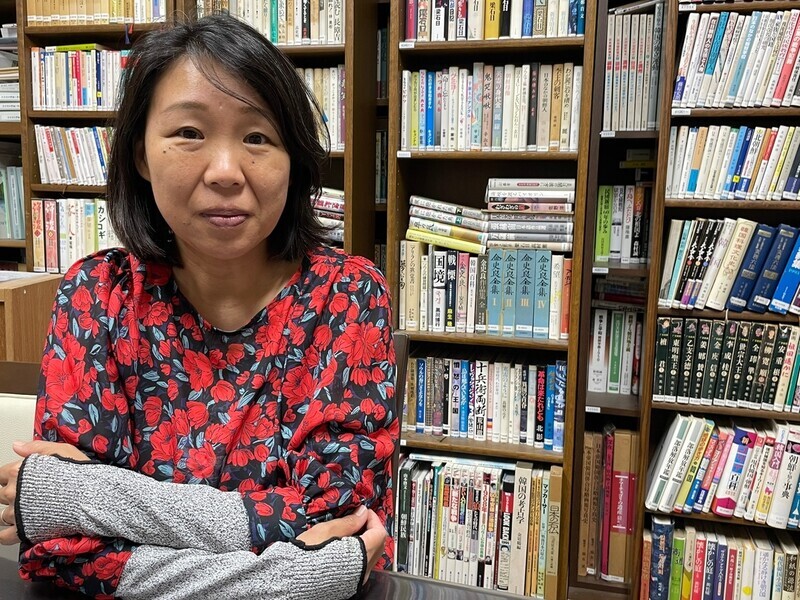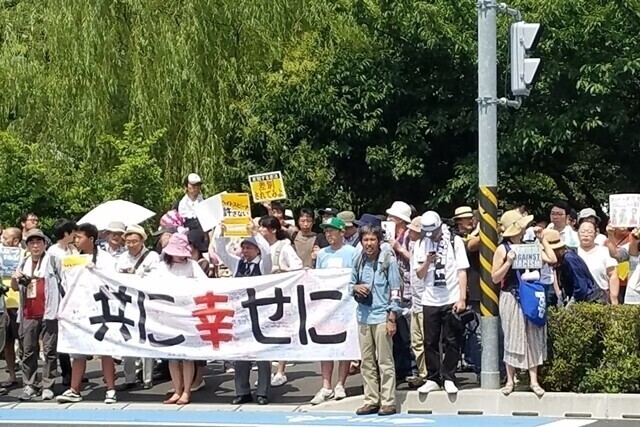hankyoreh
Links to other country sites 다른 나라 사이트 링크
[Interview] A Zainichi Korean’s ongoing fight to stamp out hatred, discrimination in Japan

“The Kawasaki ordinance is a shield protecting the future of us and our children. This is because it declared that hate speech would not be tolerated and that victims would be protected within this community.”
Choi Kang I-ja (49), a third-generation Zainichi Korean, is the director of the multicultural educational facility Fureai Hall. She also played a pivotal role in the establishment of a municipal ordinance aimed at making Kawasaki “a city without discrimination that respects human rights.”
This ordinance, which came into effect on July 1, 2020, after a long fight by Kawasaki residents, prohibits all kinds of discrimination, including that based on race, nationality, ethnicity and gender. In particular, the biggest feature is that it stipulates that a fine of up to 500,000 yen (around US$3,700) can be imposed for hate speech. Kawasaki is the first Japanese local government to impose penalties for discriminatory and hateful comments made in public places.
On June 17, ahead of the second anniversary of the ordinance going into effect, the Hankyoreh sat down with Choi Kang at Fureai Hall in Kawasaki, Kanagawa Prefecture.
“There have been no cases of fines being imposed since the ordinance went into effect. That’s not because the ordinance is powerless, but because it’s that effective at deterring hate speech,” Choi Kang said.
After the ordinance was enacted, the number of rallies, discrimination, and hate speech by far-right groups in Kawasaki, an area in Japan where a large number of ethnic Koreans reside, have decreased significantly.
Of course, discrimination and hate have not completely disappeared. Unable to take to the streets, such hate groups began to attack more transparently and persistently, using anonymity as a weapon as they posted online and sent threatening letters.
In March of last year, Choi Kang received a horrifying package in the mail.
“The word ‘die’ was written 14 times on a piece of printer paper,” Choi Kang said. “At the time, the COVID-19 situation was very serious in Japan, and [the perpetrator] also sent a bag of snacks [with the paper], saying that it was covered with COVID-19.” She said she still gets goosebumps every time she recalls that experience.
Terrified after the incident, Choi Kang started wearing a protective vest when leaving the house to protect her from any possible stabbings or other attacks. “It’s hard to leave the house if I don’t wear this. I have this huge fear that someone will jump at me out of nowhere,” she said.
Regarding the package, she said she went to the police to press charges of intimidation, but that the culprit was never caught.
Choi Kang is also actively taking steps to eliminate discrimination and hate speech online. She identified a man in his 40s living in Ibaraki Prefecture who had been consistently posting threats about her for more than six years, starting in 2016. Choi sued for damages of 3.05 million yen (US$22,600) in November last year.
Even if one were to pick out only the particularly heinous comments, there are more than 70. Nevertheless, during his trial, the man stated that the discriminatory and hateful comments he wrote were “just a matter of personal opinion.”
Choi Kang said that the words “go back where you came from” that appeared in this man's posts were particularly difficult to read.
“Over 70 years have passed since the war ended, but [Zainicihi] are still not recognized as being members of Japanese society,” Choi Kang said. “I felt like the lives of my parents, myself, and my child were being refuted. It was also a threat that he would do something if I didn’t ‘go back.’”
Although the trial — and the reliving of the incident it entailed — has been a difficult process for Choi Kang, she says she “will fight to the end.” In fact, her struggle was no longer a personal battle. As the media began covering the trial, phone calls from other Zainichi all over Japan came flooding in.
These were people who had been living in resignation for decades when they were told to “go back to your country.” These compatriots shared words of gratitude with Choi Kang, saying their own wounds have been healed thanks to her efforts.

“I think I know how they feel,” Choi Kang said. “Because we’re Koreans in Japan and foreigners, we endure discrimination, but even though time passes, those wounds and pain have remained.”
Japanese society overall has also continued the movement to eliminate hate speech. In June 2016, the Act on the Promotion of Efforts to Eliminate Unfair Discriminatory Speech and Behavior against Persons Originating from Outside Japan, also known as the Hate Speech Act, was enacted.
There is no penalty clause, so there continues to be debate about its effectiveness, but through this law, the perception that hate speech is something that is unacceptable and should not be condoned has spread widely.
From the city of Osaka in January 2016 to Mie Prefecture last month, 17 local governments in Japan have also enacted and implemented ordinances prohibiting discrimination and hate.
However, discrimination and hatred are not stopped so easily. In July of last year, a Japanese man in his 20s set fire to the Aichi headquarters of the Korean Residents Union in Japan (Mindan) and to Korean school facilities in Nagoya, damaging the buildings. Then, in August, the same man set fire to an empty house in Utoro, Kyoto — a historically Korean neighborhood — resulting in seven other houses burning down.
During the prosecution's investigation, the man said that he committed the crime because of his “disgust” toward Koreans.
“Right now, the online space is completely lawless,” Choi Kang says, adding that measures must be taken to draw a red line.
Choi Kang argued that a comprehensive anti-discrimination law should be established so that discrimination and hate can be met with punishment when it occurs.
In addition, Choi Kang argues for the creation of an independent human rights watchdog resembling the National Human Rights Commission of Korea so that victims can get help as soon as possible even without going to trial, which costs time and money.
Choi Kang says it is necessary for victims who, for years, have been unable to speak out about their discriminatory experiences to finally be given the opportunity to make their own appeals.
“Only then can the wounds be healed and discrimination be eliminated,” she said.
By Kim So-youn, Tokyo correspondent
Please direct questions or comments to [english@hani.co.kr]

Editorial・opinion
![[Editorial] Penalties for airing allegations against Korea’s first lady endanger free press [Editorial] Penalties for airing allegations against Korea’s first lady endanger free press](https://flexible.img.hani.co.kr/flexible/normal/500/300/imgdb/original/2024/0502/1817146398095106.jpg) [Editorial] Penalties for airing allegations against Korea’s first lady endanger free press
[Editorial] Penalties for airing allegations against Korea’s first lady endanger free press![[Editorial] Yoon must halt procurement of SM-3 interceptor missiles [Editorial] Yoon must halt procurement of SM-3 interceptor missiles](https://flexible.img.hani.co.kr/flexible/normal/500/300/imgdb/child/2024/0501/17145495551605_1717145495195344.jpg) [Editorial] Yoon must halt procurement of SM-3 interceptor missiles
[Editorial] Yoon must halt procurement of SM-3 interceptor missiles- [Guest essay] Maybe Korea’s rapid population decline is an opportunity, not a crisis
- [Column] Can Yoon steer diplomacy with Russia, China back on track?
- [Column] Season 2 of special prosecutor probe may be coming to Korea soon
- [Column] Park Geun-hye déjà vu in Yoon Suk-yeol
- [Editorial] New weight of N. Korea’s nuclear threats makes dialogue all the more urgent
- [Guest essay] The real reason Korea’s new right wants to dub Rhee a founding father
- [Column] ‘Choson’: Is it time we start referring to N. Korea in its own terms?
- [Editorial] Japan’s rewriting of history with Korea has gone too far
Most viewed articles
- 160% of young Koreans see no need to have kids after marriage
- 2Presidential office warns of veto in response to opposition passing special counsel probe act
- 3Months and months of overdue wages are pushing migrant workers in Korea into debt
- 4[Editorial] Penalties for airing allegations against Korea’s first lady endanger free press
- 5Japan says it’s not pressuring Naver to sell Line, but Korean insiders say otherwise
- 630th anniversary Wednesday Demonstration pushed out of memorial site by far-right
- 7Dermatology, plastic surgery drove record medical tourism to Korea in 2023
- 8[Reporter’s notebook] In Min’s world, she’s the artist — and NewJeans is her art
- 9OECD upgrades Korea’s growth forecast from 2.2% to 2.6%
- 10Inside the law for a special counsel probe over a Korean Marine’s death